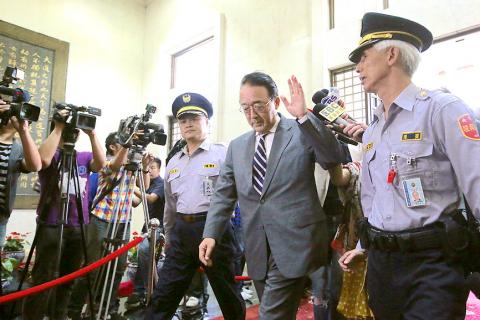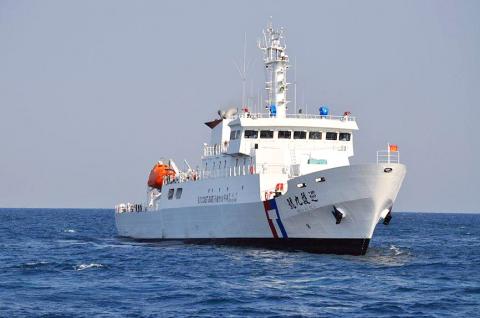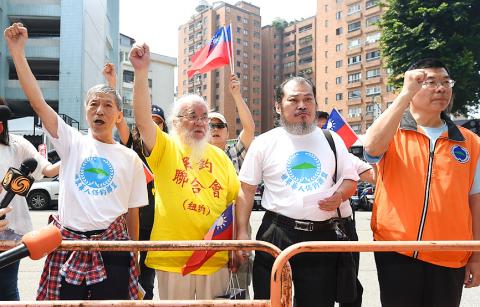Taiwan summoned Japan’s representative yesterday to protest its seizure of a Taiwanese fishing boat in an area where Tokyo claims exclusive rights, while Taipei is sending two vessels — one from the Coast Guard Administration (CGA) and the other from the Council of Agriculture — to the waters around the disputed atoll to defend the rights of the nation’s fishermen.
The 50-tonne Tung Sheng Chi 16 fishing vessel was chased for hours by a Japanese vessel and seized earlier this week, about 150 nautical miles (277.8km) from Okinotori atoll, which is administered by Japan.
The seizure of the fishing boat prompted protest from Taipei, which said Japan had no authority over the area and demanded the release of the ship and 10 crew.

Photo: CNA
They were later freed, but tensions remained.
The release came only after the ship’s owner paid a “deposit” of ¥6 million (US$54,000) demanded by Japanese authorities, the Ministry of Foreign Affairs said in a statement.
Minister of Foreign Affairs David Lin (林永樂) expressed the nation’s displeasure to Japanese Representative to Taiwan Mikio Numata.

Photo: CNA, courtesy of the Coast Guard
“We told them that we have never recognized the exclusive economic zone [EEZ] around Okinotorishima and they had no right to seize the fishing boat,” Lin told reporters.
Okinotori is an uninhabited atoll in the Philippine Sea that is mostly submerged at low tide.
The EEZ claim has also been rejected by China and South Korea, although neither country has made its own claim.

Photo: Liao Chen-huei, Taipei Times
As a show of force, the CGA said that Taiwan would tomorrow dispatch two patrol ships to the area considered high seas by Taiwan near the Japanese-controlled atoll in the western Pacific to protect Taiwanese fishermen operating in the area.
The Legislative Yuan yesterday issued a statement, endorsed by all party caucuses, condemning Japan’s confiscation of the boat and Tokyo’s demand for a security deposit.
Announced by Legislative Speaker Su Jia-chyuan (蘇嘉全), the statement read: “We are here to express our strong denunciation and protest against the Japan Coast Guard’s seizure of Taiwanese fishing boat Tung Sheng Chi No. 16, handcuffing our fishermen, stripping them for examination and usurping NT$1.7 million [US$52,662] as a security deposit in the high seas, which violated human rights, fishing rights and rights to sail in international waters and run afoul of the UN Convention on the Law of the Sea that guarantees the freedom of the high seas.”
According to Article 121 of the convention, an island is a “naturally formed area of land, surrounded by water, which is above water at high tide,” but the Okinotori atoll, which is only 9m2, is a “rock which cannot sustain human habitation or economic life of its own” and therefore does not have an exclusive economic zone or continental shelf, the statement said.
The legislature said it is lodging “serious condemnation and protest” against Tokyo’s alleged breach of the international convention, “arbitrary expansion of its EEZ” and “seizure of our boat,” which are “bullying acts” that have damaged the long-term friendship of the two nations.
Separately, Premier Simon Chang (張善政) asked the Japanese government not to view Taiwan as an “easy target,” saying that South Korean fishing boats were not confiscated in similar situations.
“We will definitely not accept being treated as an easy target,” the premier said. “Taiwanese are friendly toward Japan and Japan should not make our people feel that we are ‘kissing cold butt with a hot face.’”
Additional reporting by Alison Hsiao and CNA

‘ABUSE OF POWER’: Lee Chun-yi allegedly used a Control Yuan vehicle to transport his dog to a pet grooming salon and take his wife to restaurants, media reports said Control Yuan Secretary-General Lee Chun-yi (李俊俋) resigned on Sunday night, admitting that he had misused a government vehicle, as reported by the media. Control Yuan Vice President Lee Hung-chun (李鴻鈞) yesterday apologized to the public over the issue. The watchdog body would follow up on similar accusations made by the Chinese Nationalist Party (KMT) and would investigate the alleged misuse of government vehicles by three other Control Yuan members: Su Li-chiung (蘇麗瓊), Lin Yu-jung (林郁容) and Wang Jung-chang (王榮璋), Lee Hung-chun said. Lee Chun-yi in a statement apologized for using a Control Yuan vehicle to transport his dog to a

Taiwan yesterday denied Chinese allegations that its military was behind a cyberattack on a technology company in Guangzhou, after city authorities issued warrants for 20 suspects. The Guangzhou Municipal Public Security Bureau earlier yesterday issued warrants for 20 people it identified as members of the Information, Communications and Electronic Force Command (ICEFCOM). The bureau alleged they were behind a May 20 cyberattack targeting the backend system of a self-service facility at the company. “ICEFCOM, under Taiwan’s ruling Democratic Progressive Party, directed the illegal attack,” the warrant says. The bureau placed a bounty of 10,000 yuan (US$1,392) on each of the 20 people named in

INDO-PACIFIC REGION: Royal Navy ships exercise the right of freedom of navigation, including in the Taiwan Strait and South China Sea, the UK’s Tony Radakin told a summit Freedom of navigation in the Indo-Pacific region is as important as it is in the English Channel, British Chief of the Defence Staff Admiral Tony Radakin said at a summit in Singapore on Saturday. The remark came as the British Royal Navy’s flagship aircraft carrier, the HMS Prince of Wales, is on an eight-month deployment to the Indo-Pacific region as head of an international carrier strike group. “Upholding the UN Convention on the Law of the Sea, and with it, the principles of the freedom of navigation, in this part of the world matters to us just as it matters in the

The High Court yesterday found a New Taipei City woman guilty of charges related to helping Beijing secure surrender agreements from military service members. Lee Huei-hsin (李慧馨) was sentenced to six years and eight months in prison for breaching the National Security Act (國家安全法), making illegal compacts with government employees and bribery, the court said. The verdict is final. Lee, the manager of a temple in the city’s Lujhou District (蘆洲), was accused of arranging for eight service members to make surrender pledges to the Chinese People’s Liberation Army in exchange for money, the court said. The pledges, which required them to provide identification